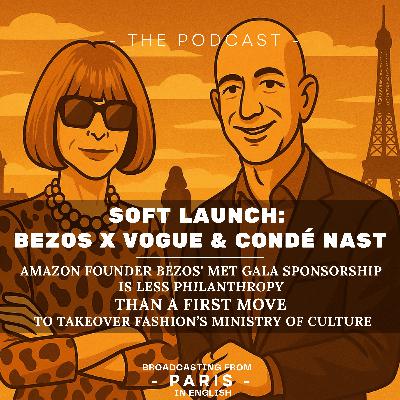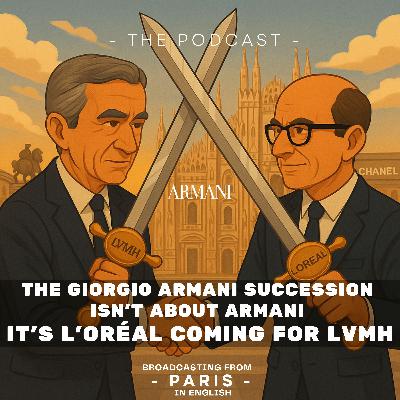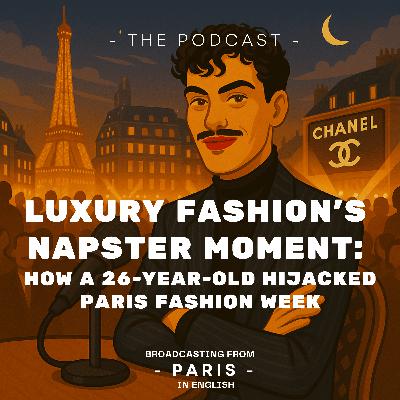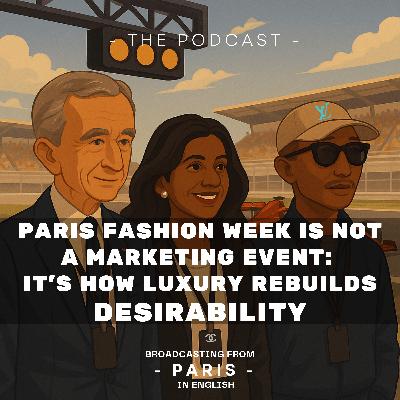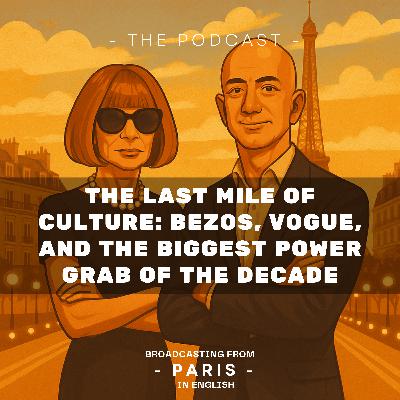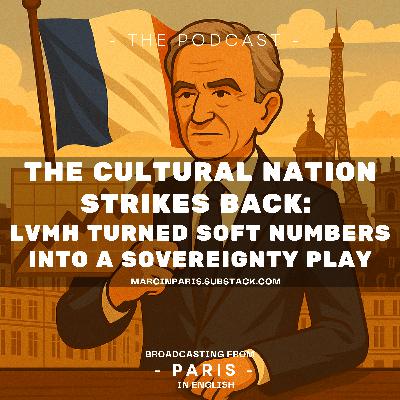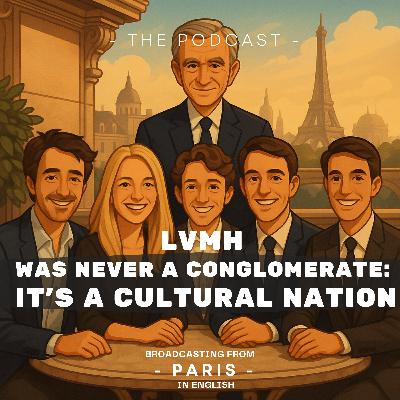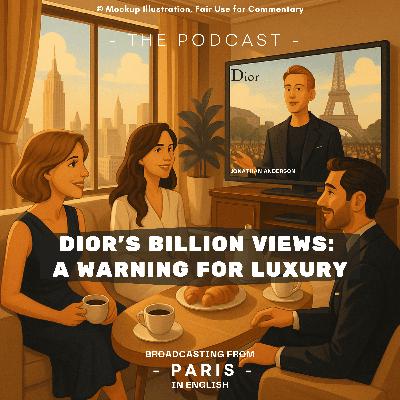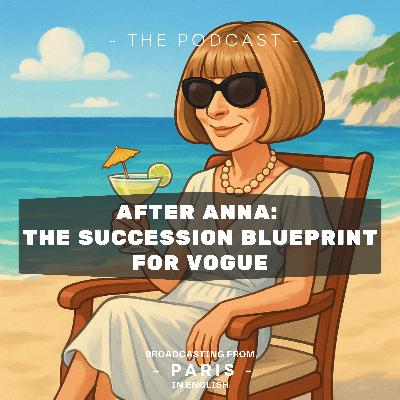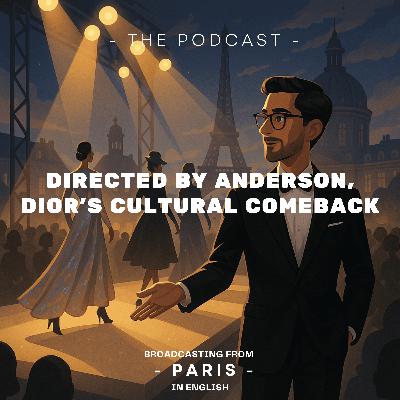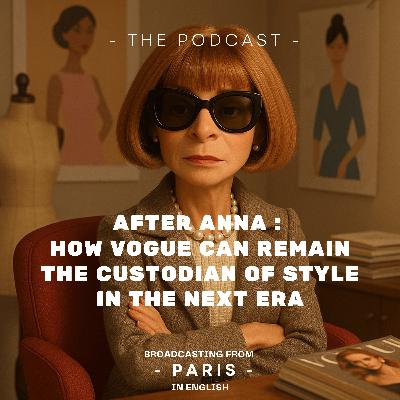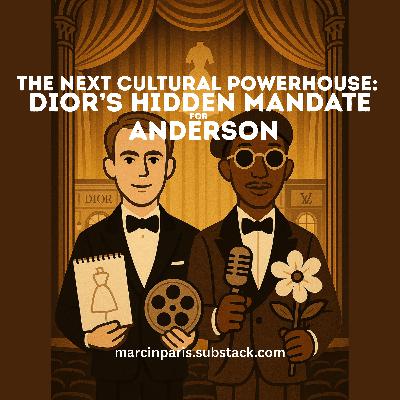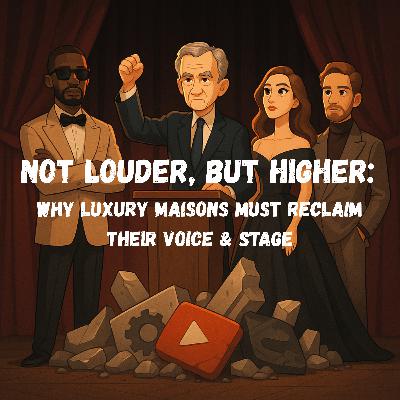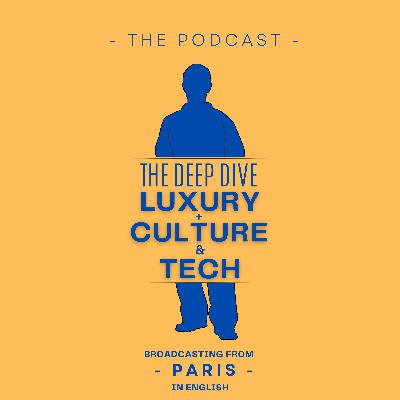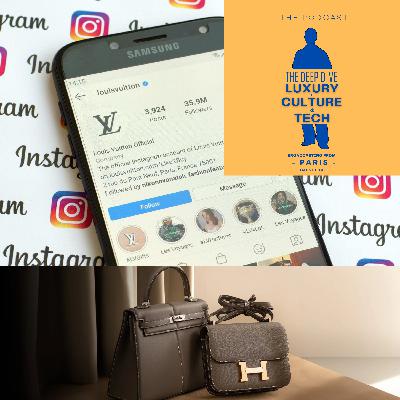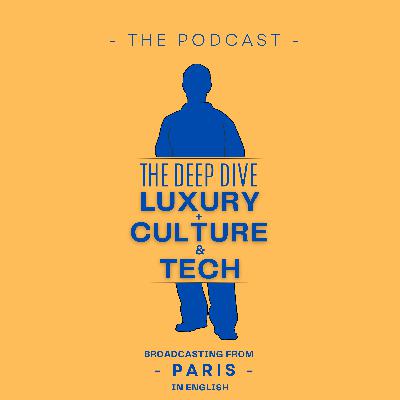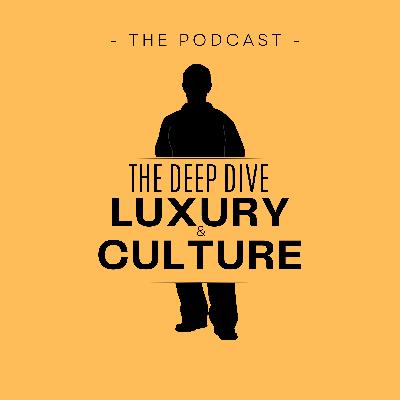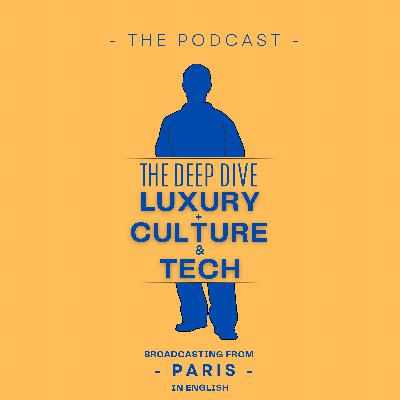Discover Desirability is the new Margin - from Paris 🇫🇷
Desirability is the new Margin - from Paris 🇫🇷

Desirability is the new Margin - from Paris 🇫🇷
Author: The Deep Dive Team
Subscribed: 0Played: 0Subscribe
Share
Description
Desirability Is the New Margin is the podcast where luxury, culture, and business strategy converge. Broadcasting from Paris, each episode unpacks the hidden forces shaping global taste, from LVMH and Hermès to Vogue and Nike. Seasoned voices in culture and strategy go beyond quarterly results to explore why desirability, not scale, is the new driver of growth, power, and cultural capital.
With insights drawn from boardrooms, runways and culture, this is essential listening for executives, investors, and decision-makers who want to understand how narrative, myth, storytelling and soft power are redefining business in the 21st century.
Read analysis here: https://marcinparis.substack.com
25 Episodes
Reverse
A $30 glass teddy bear mug caused riots, police calls, and a secondary market listing cups for up to $50,000. Drawing on Marc Abergel's analysis, we unpack the Starbucks Bearista Cup launch as a live-fire experiment in modern desirability – and how a mass coffee chain accidentally moved like Hermès, then apologized for it.We show how Starbucks behaves less like a coffee shop and more like a “cultural nation”: 75 million rewards members, seasonal rituals like Pumpkin Spice and Red Cup Day and decades of collectible nostalgia.We break down the brutal math of the launch – where resellers made more than three times Starbucks’ own revenue – and diagnose the four “sovereignty failures” in access, resale, narrative, and data that turned a coronation into a street fight. Then we flip it: a concrete “desirability playbook” for any brand with a fanbase, from Nike to Trader Joe’s, on how to choreograph access, own the aftermarket, author the story, and reward the people who camp out at 3 a.m. This isn’t just about coffee; it’s about who owns desire in your category.Top quotes: “Starbucks proved they have the cultural power of a luxury brand – they just don’t yet have the infrastructure to steward it.”“That 75 million rewards list isn’t a customer file, it’s a constituency.”“The people lining up at 3 a.m. didn’t just want the cup – they wanted to be first. Access equals status.”“You’ve got a $30 glass bear triggering the same behavior as a multimillion-dollar Birkin at auction; the psychology is identical, the difference is control.”“Starbucks did all the work to build the desire, then watched other people walk away with more than three times the profit. That’s the brutal math.”“It was a battlefield, not a ceremony – a luxury brand would never treat its inner circle that way.”"The narrative of the launch was dictated by the TikTok algorithm, not by the brand.”
Jeff Bezos doesn’t just want boxes at your door, he wants the last mile of culture. In this episode, we unpack the persistent rumour, through the analysis of Marc Abergel, a luxury executive based in Paris, that Amazon’s founder is coming for Condé Nast and Vogue, not as a media trophy, but as the ultimate cultural operating system.We break down why this would be the biggest power grab in luxury and media in a generation: the king of logistics fusing with fashion’s Ministry of Culture, Anna Wintour as “cultural general” to Bezos’ empire and what it means when taste itself becomes a cloud service optimized for conversion.For CEOs, CMOs and creative leaders, this is not about magazines. It’s about who owns desire, who writes the canon of taste and whether LVMH, Chanel, Hermès and Kering can defend their cultural sovereignty in a world where desirability is the new margin.Full analysis here: https://marcinparis.substack.com/p/soft-launch-bezos-x-vogue-and-condeSelected quotes from episode: “This isn’t a media deal, it’s the biggest cultural power grab of the decade.”“Bezos has already conquered the last mile of commerce; now he wants the last mile of culture.”“Amazon knows what you buy. Vogue knows what you aspire to buy. This is the vertical integration of influence.”“To own Vogue is to own the compass that orients aspiration for the entire industry.”“If Bezos becomes Caesar, Anna Wintour is his cultural general, his infrastructure, her authority.”“Under Bezos, Vogue could become a cultural AWS: taste on demand, provisioned at scale, rented by any brand that wants instant legitimacy.”“Luxury houses risk becoming vendors inside someone else’s cultural nation of taste, negotiating from occupied territory.”“This rumour signals a new reality: culture is the ultimate infrastructure, because it generates demand in the first place.”“Luxury can’t answer this with another seasonal campaign; it needs a sovereign stack for culture and taste.”Read moreSoft Launch: Bezos x Vogue & Condé Nast | Amazon Founder Bezos' Met Gala sponsorship is less philanthropy than a first move to takeover fashion’s Ministry of Culture
Paris Fashion Week just became the opening act of a new empire war. In this episode we unpack Marc Abergel (Luxury Executive based in Paris) analysis of the strategic chess match between LVMH and L’Oréal, a clash not just for Armani, but for the future architecture of luxury itself. (Read Marc Abergel's article here: The Armani Succession Isn't About Armani. It's L'Oréal Coming for LVMH) It’s The Vatican of Desire vs. The Colosseum of Access: scarcity versus scale, mystique versus mass aspiration.From the quiet corridors of Dior to the open-air spectacle of L’Oréal Paris, we explore how data, beauty licenses and public theater are rewriting the balance of power in global luxury. And why the winner may not be the one you expect.Listen as we decode how one acquisition could turn L’Oréal from a beauty powerhouse into a $50 billion fashion sovereign by 2030 and why Bernard Arnault may already have Barbarians at his gates.Selected quotes:“It’s the Vatican of Desire vs. the Coliseum of Access.”“Armani isn’t the prize—it’s the test.”“LVMH bets that distance creates desire; L’Oréal bets that access creates loyalty.”“L’Oréal isn’t bidding on an asset—it’s completing a system.”“$7 billion isn’t a price tag; it’s a down payment.”“Beauty licenses aren’t just revenue—they’re Trojan horses of data.”“Sephora proves LVMH can run a Coliseum; it just keeps it walled off from fashion.”“This is an operating-system war, not a bigger-check contest.”“Rome watched Persia; the Barbarians sacked the city.”“Will LVMH notice the rival empire before it’s already inside the gates—drinking their champagne?”https://marcinparis.substack.com/p/the-armani-succession-isnt-about
What happens when a single content creator outsmarts the world’s most powerful luxury Maisons? Based on the analysis of Marc Abergel, luxury executive in Paris, this episode unpacks the phenomenon of Lyas Medini: the 26-year-old Parisian who turned rejection from Dior into a revolution. In just four months, he went from watching shows on a bar TV to commanding thousands at live “watch parties” that drew bigger crowds than Chanel itself.But this isn’t just a viral story, it’s a wake-up call. Luxury’s entire system of control, from access to data, narrative, and distribution, is being rewritten in real time. Drawing on Abergel’s essay “Fashion’s Napster Moment,” this conversation explores how Lyas exposed the industry’s soft underbelly: its dependence on platforms it doesn’t own, and its fear of seeming “anti-democratic.”It’s not just about fashion anymore, it’s about sovereignty, storytelling, and who truly owns desire.“Lyas didn’t democratize fashion—he hijacked it.” “Fashion’s Napster Moment isn’t coming. It’s here.” “He kicked the door down and showed them the room was full of people waiting to get in.” “The Maisons create the million-euro show. Lyas captures the audience, the data, and the future customers.” “Luxury was never just about who gets inside the show. It was always about who controls the door itself.”
In this episode, Marc Abergel, luxury executive based in Paris, reframes Paris Fashion Week not as a marketing spectacle but as a battleground for cultural sovereignty. Through the lens of Dior’s billion-view paradox and Formula 1’s reinvention, he lays out a five-act Coronation Playbook for Maisons to reclaim authorship, pricing power, and direct audience control.This is not marketing chatter. It’s a C-suite strategic briefing on how to build moats of aura, command a sovereignty premium, and turn Fashion Week into civilization’s cultural calendar. Executives across luxury, media, and finance will find a provocative roadmap for what it takes to win not the season, but to win culture itself. “The paradox lies in the immediate surrender of authorship. Maisons spend millions to stage sacred rituals, only to hand them over to algorithmic chaos.”“Formula 1’s revolution wasn’t just on the track, it was a masterful sovereignty play in culture itself.”“Access in luxury is not exclusion, it is elevation. The most loyal are ushered from the antechamber into the throne room.”“A handbag becomes more than leather and hardware. It becomes an artifact of a cultural coronation, a vessel of ritual and memory.”“The choice is stark: surrender sovereignty to the feed, or rebel by becoming authors of culture, not tenants of the algorithm.”
What happens when the man who mastered the last mile of commerce sets his sights on the last mile of culture? In this episode, we unpack Jeff Bezos’s rumored bid for Condé Nast and Vogue, not as a trophy purchase, but as what Marc Abergel, luxury executive from Paris, calls “the biggest cultural power grab of the decade.”Through the lens of Abergel’s "After Anna: Bezos’ Quest to Redefine Taste, will Luxury Surrender or Rebel?" article, we trace how Vogue has long acted as a cultural nation, defining desire for over a century, and why its potential merger with Amazon’s infrastructure could redraw the boundaries of influence. What’s at stake is nothing less than sovereignty over taste itself.Luxury Maisons: LVMH, Chanel, Hermès, face a stark choice: remain tenants in Bezos’s empire of desire, or reclaim their role as sovereign cultural nations. We explore Abergel’s proposed Sovereign Stack: Embassies, Rituals, Sacred Texts, and Diplomats; as luxury’s blueprint for survival in this looming Cold war for culture.This isn’t just about media or fashion. It’s about whether myth-making, the last true luxury, remains in the hands of Maisons and Brands, or gets folded into Bezos’s algorithmic canon.“Bezos isn’t buying Vogue for its balance sheet. He wants to command the very channel through which meaning itself is delivered, one-click desirability.”“Vogue has acted as a sovereign cultural nation, dictating taste and status for generations.”“If Bezos owns the authority to define desirability, luxury Maisons risk becoming mere vendors inside someone else’s cultural nation of taste, negotiating from occupied territory.”“The canon is the moat. Cultural assets, magazines, archives, foundations - are immune to algorithmic decay.”“In an age where AI can generate taste on demand, human-led myth-making may be the last true luxury.”
What happens when the world’s largest luxury group posts a soft quarter, yet its stock rallies?In this episode, we unpack Marc Abergel’s provocative article: The Cultural Nation Strikes Back, exploring how LVMH flipped weak financials into a flex of cultural statecraft. From Versailles with a ticker symbol to Olympic myth-making and quiet luxury diplomacy, this isn’t just about handbags: it’s about heritage, narrative power, and the sovereign currency of desire.We break down LVMH’s cultural sovereignty plays over the last few months (Dior, Moët Hennessy Private, the Olympics, and Sephora), and explain why the market might be waking up to a new valuation paradigm: one where legacy outperforms virality, and storytelling is the strategy.If cultural capital is the new margin, LVMH may already be the world’s most powerful organization.“It wasn’t a retreat. It was a sovereignty move.” On how LVMH’s Q2 results weren’t a dip, but a strategic investment in cultural dominance.“Versailles with a ticker symbol: where heritage commands.” Abergel’s thesis in one bold line.“LVMH doesn’t follow eras. It defies them.” Reframing time, relevance, and taste as levers of power.“Cultural Sovereignty is the new margin.” A new KPI for luxury: not just profit, but narrative control.“While others make noise, LVMH is defining taste.” On why quiet luxury, myth, and legacy trump trend-chasing.
In this powerful episode of The Deep Dive, Marc Abergel, luxury executive based in Paris, reframes the entire conversation around LVMH. Against a wave of criticism painting the group as a bloated, overstretched conglomerate, most notably Bloomberg’s June 2025 piece. Abergel offers a sharp, compelling counter-narrative: LVMH is not a conglomerate in crisis; it is a cultural nation by design.Bernard Arnault is positioned not as a CEO struggling with scale, but as a maestro of meaning, orchestrating a federation of Maisons with cultural stewardship, not corporate consolidation. Through this lens, Fendi, Sephora, Tiffany, Loro Piana, and even Rimowa emerge not as scattered assets, but as curated instruments in a long-term symphony of desire.The podcast argues that LVMH’s true moat isn’t market share or real estate, it's narrative control. Each Maison is positioned as a cultural force, not a commodity. The so-called “succession drama” described by Bloomberg becomes, in Abergel’s view, a generational design: five heirs anchoring a republic of savoir-faire, not battling for a crown.The episode challenges luxury leaders to rethink value creation, not in terms of quarterly earnings or digital scale, but through the emotional ROI of legacy, story, and reverence. What if the next great luxury innovation isn’t product, but cultural sovereignty.“LVMH was never a conglomerate, it’s a federation of cultural institutions, stewarded with creativity and long-term conviction.”“What Bloomberg sees as bloat, Abergel sees as orchestration, sometimes messy, always intentional.”“Arnault isn’t managing a portfolio, he’s curating desire.”“The true advantage of LVMH isn’t property or products. It’s narrative control.”“You’re not witnessing a monarchy in crisis, you’re witnessing a republic of culture and savoir-faire preparing for its next era.”
What if the most impressive fashion stat of the year: Dior Men’s Summer 2026 film hitting ONE BILLION views isn't a victory, but a strategic red flag?In this provocative episode, Marc Abergel, luxury executive based in Paris, unpacks why mass visibility might be eroding the very thing that makes luxury… luxury. Through his concept of cultural sovereignty, Abergel argues that the race for virality dilutes the aura, mystique, and reverence that historically made luxury Maisons like Dior, Vuitton, Chanel, Rolex or Hermès, truly desirable.Referencing Jonathan Anderson’s beautifully choreographed runway as a "ritual of intimacy", the episode explores the tension between authorship and algorithms, scale and meaning, speed and sequence. Abergel proposes a new paradigm for luxury storytelling: one that goes vertical, not viral: beginning with the most loyal clients in sacred, intimate spaces before broadcasting to the world.From fashion to tech to art, this is a blueprint for reclaiming narrative control in a noisy, flattened digital world.“The billion views weren’t the objective. They were the echo of a cultural shift.”“Luxury at its best is about story revealed, not dumped. Whispered to the few before it echoes to the many.”“We’ve mistaken views for relevance, and scale for success.”“If you buy Dior at Dior, you should watch Dior at Dior.”“The future isn’t more reach. It’s deeper resonance.”"LVMH and its peers have the means to outsmart Big Tech's algorithm"Read us at http://marcinparis.substack.com
What happens when the most influential figure in modern fashion steps down? Drawing on insights from Marc Abergel's article, we explore why Anna Wintour’s eventual departure from Vogue is not a mere editorial change: it’s a civilizational moment. We dive deep into the symbolic, strategic, and mythic dimensions of succession at Vogue.More than just a magazine, Vogue is portrayed as a Ministry of Culture, an institution responsible for shaping collective taste, aspiration, and style. The podcast breaks down the four essential powers required for Vogue's next editor-in-chief and examines eight potential successors, not merely as candidates but as archetypes, each representing a radically different future for fashion and culture. They are: Ava Duvernay, Edward Enninful, Ruth E. Carter, Phoebe Philo, Michaela Coel, Pharrell Williams, Kim Jones and Daniel Roseberry.For leaders across the luxury and media industries, this episode offers a rare lens on how cultural authority is crafted, maintained, and potentially lost."This isn’t just a vacancy. It’s a vacuum — a sudden stillness in the cultural stratosphere.""The next editor-in-chief has to preside, not just post. Without that gravity, even beautiful images become content clutter.""Vogue's next leader isn’t just an editor — they are a Minister of Cultural Affairs.""In a world fighting for attention, sometimes silence is the loudest form of authorship.""We don’t just need a new Anna. We need the next sovereign of style."
In this episode, we unpack an analysis by Marc Abergel, luxury executive from Paris to discuss how Jonathan Anderson’s arrival at Dior Men isn’t just a change in creative direction, it’s a cinematic coup. With his debut collection, Anderson reframes Dior not as a heritage brand but as a storytelling studio, capable of choreographing emotional gravity, visual drama, and global relevance.We explore how his approach taps into luxury’s deeper mission: to not just make fashion, but to shape cultural mythologies. If LVMH made Dior global, Anderson might make it eternal.“Anderson doesn’t design clothes. He directs scenes.”“This wasn’t a runway. It was a cinematic portal: Paris turned into a dreamscape.”“Dior’s comeback isn’t about louder logos. It’s about reclaiming cultural authorship.”“Luxury brands don’t just need storytellers. They need myth-makers. Anderson gets that.”“Where most brands chase the algorithm, Dior under Anderson is chasing emotional resonance.”Title: Directed by Anderson, Dior’s Cultural Comeback. Dior's debut reimagines fashion as authorship: cinematic, symbolic, choreographed and scripted with cultural intentLVMH DIOR ANDERSON
What happens when the most powerful woman in fashion steps down?In this episode, we deep-dive into Marc Abergel's analysis and unpack the cultural vacuum left by Anna Wintour’s departure from Vogue, and what’s truly at stake: not just a job, but the role of custodian of global style.Who will inherit the crown - and should anyone?We explore the symbolic weight of Vogue’s top seat, the rise of decentralized tastemaking, and why the next editor must move beyond red carpets and cover shoots to reclaim narrative sovereignty in the algorithm age. It's not just fashion, it’s power, perception, and who gets to define the world’s aesthetic compass.“Anna wasn’t just editing a magazine, she was editing the culture.”“The question isn’t who’s next. It’s what Vogue should be next.”“If platforms own the distribution, Vogue must own the desire.”“The editor-in-chief role is no longer about taste, it’s about sovereignty.”“Whoever steps in must know: you’re not just dressing celebrities, you’re dressing civilization.”
What made Formula 1 go from elite motorsport to global entertainment juggernaut? In just under 11 minutes, this episode unpacks F1’s explosive growth: driven not by faster cars, but by smarter storytelling. From Netflix’s Drive to Survive to high-octane brand partnerships with giants like Disney, LEGO, Louis Vuitton, Tag, Moet, LVMH - F1 has reinvented itself as a cultural property, rivalling the NFL and NBA in reach and relevance. We explore how the sport has become a masterclass in narrative branding, content-driven fan engagement, and entertainment-led expansion - what we call Cultural Sovereignty. Whether you're a marketer, brand leader, or just a culture geek, this is your pit stop for insight.“Formula 1 didn’t just get louder, it got smarter.”“Drive to Survive didn’t change the sport. It revealed the drama that was always there.”“F1 is no longer just a race, it’s a serialized global narrative with brand partners as co-authors.”“The partnership with Netflix wasn’t just media, it was myth-making.”“What F1 teaches us is that performance alone doesn’t create value, storytelling does.”
We deep dive into Marc Abergel's article about what happens when one of fashion’s most poetic minds inherits the keys to a cultural empire? In this 13-minute episode, we unpack Jonathan Anderson’s appointment at Dior — not as just another creative director move, but as the start of a new artistic mandate.From storytelling sovereignty to cinematic imagination, Dior isn’t just hiring talent — it’s rewriting its role as a cultural institution. This is Anderson’s moment to turn the Maison into a mythmaking force beyond fashion.Tune in for a blueprint of how luxury must evolve: less content, more meaning. Less campaign, more culture.“Dior doesn’t need a new look. It needs a new voice.”“Anderson is not just a designer — he’s a narrative architect.”“Luxury is no longer about owning the product. It’s about owning the frame.”“The future of fashion isn’t on the runway — it’s in the screenplay.”“If LVMH is an empire, Dior must now become its cultural parliament.”
Luxury once whispered and the world leaned in. Today, it scrolls past unnoticed. In this 15-minute solo episode, we unpack the silent erosion of luxury’s power — and why it's time for a strategic reset. From algorithmic dependencies to diluted storytelling, this is a cultural diagnosis and a call to action: Luxury Maisons must reclaim authorship, distribution, and aura before the scroll strips it all away. Because in this industry, the question is no longer how to get seen — but how to be felt, remembered, and desired. We deep-dive into an article by Marc Abergel, luxury executive based in Paris.“Luxury traded sovereignty for exposure. Intimacy for impressions. Authorship for access.”“The Maison’s story used to be whispered like a secret. Now it’s shouted into the scroll.”“Big Tech platforms aren’t neutral. They’re temples of attention — with their own rituals, and their own gods.”“Visibility without control is exposure. And exposure, without the right frame, erodes aura.”“Luxury isn’t about showing up everywhere. It’s about being unforgettable in one place.”
What do Dior documentaries on Amazon Prime and Veuve Clicquot at a gas station have in common? They’re both powerful symbols of luxury losing control of its context. In this bold episode, we unpack why Big Tech platforms, designed for speed, reach, and mass attention, are incompatible with luxury’s codes of mystique, scarcity, and ritual. This is a call to arms: for luxury Maisons to stop outsourcing their stories, reclaim narrative sovereignty, and build cultural ecosystems that match the same standards as their ateliers.“In luxury, the frame is part of the value. And Big Tech platforms are not neutral frames.”“Would you sell Veuve Clicquot at a gas station? Then why surrender your story to TikTok?”“Desirability isn’t viral. It’s curated.”“Luxury Maisons mastered verticality, from vineyards to boutiques, but left their stories in someone else’s hands.”“We don’t need more followers. We need our own stage.”
In a surprising market shift, Hermès has overtaken LVMH in valuation — but the real story isn’t about numbers. It’s about the future of luxury itself.This episode unpacks how Hermès, once seen as too niche or too quiet, is now defining the new codes of desirability: restraint over reach, discretion over domination, and timelessness over trend.What can the rest of the luxury world learn from this? And is LVMH’s playbook still relevant in a post-hype era?A must-listen for anyone who cares about power, perception, and the next chapter in luxury strategy.“Hermès didn’t win by scaling. It won by staying still.”“In a world obsessed with speed, Hermès built desire through silence.”“LVMH mastered reach. Hermès mastered restraint.”“The future of luxury belongs to brands that whisper, not shout.”“True value isn’t built through visibility — it’s built through invisibility.”
What happens when artificial intelligence learns how to trigger desire and luxury brands follow its cues?In this episode, we explore how AI isn’t just transforming operations or marketing, it’s redefining taste itself. From curated algorithms to emotional manipulation, we break down the subtle shift from human intuition to machine-predicted craving, and what it means for the future of brand storytelling, exclusivity, and allure.The real question: when desire is generated by data, can anything still feel truly rare?We deep dive into Marc Abergel's (luxury exec based in Paris) his Op-Ed: Who Owns Desire Now - AI or Luxury Maisons?The Big Tech platforms that organize taste will soon control the $400 billion global luxury market, unless the Maisons reclaims their cultural sovereigntyThe op-ed argues that luxury Maisons are at risk of losing control over consumer desire as large technology companies and their AI systems become the primary interface for shopping. Historically, luxury was defined by personal interaction, curated experiences, and storytelling, but AI is now stepping in to guide purchasing decisions based on data and algorithms. This shift is problematic because AI prioritizes efficiency and popularity, fundamentally clashing with luxury's values of scarcity, mystique, and craftsmanship. The author urges luxury brands to develop their own "Cultural AI" to maintain authorship over their narratives and preserve the unique emotional resonance of luxury. Ultimately, the text suggests that reclaiming technological sovereignty is essential for luxury to shape its future rather than being defined by external algorithms.
What does it mean to be a fashion brand in a world defined by uncertainty?In this episode, we explore how global volatility — from political polarization to climate disruption and shifting consumer values — is reshaping the fashion industry in real time.It’s a big-picture reflection on the future of creativity, responsibility, and brand strategy when nothing feels stable — and why the most forward-thinking players are focusing less on trends and more on truth.
From algorithms to artisans: luxury is resetting.What does luxury look like in 2025? In this fast-moving chat looking at Business of Fashion & McKinsey’s latest study on The State of Luxury, we break down the key trends shaping the new language of fashion - from the rise of cultural capital to the fall of celebrity-endorsed flash.Expect sharp takes on quiet power branding, retail’s next phase, the rebirth of craftsmanship, and how brands must rethink influence in an age of distrust and saturation.Whether you’re a strategist, creative, or just watching luxury, fashion and haute couture evolve — this is your briefing on the future.



